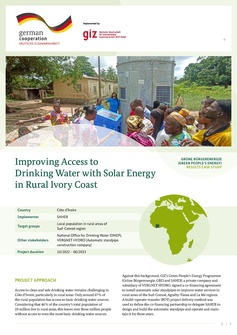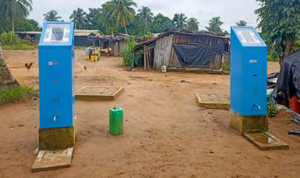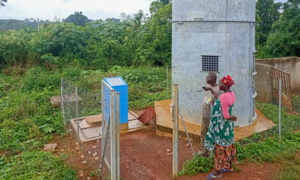Improving Access to Drinking Water with Solar Energy in Rural Ivory Coast
Improving Access to Drinking Water with Solar Energy in Rural Ivory Coast
Project Approach
Access to clean and safe drinking water remains challenging in Côte d’Ivoire, particularly in rural areas. Only around 67 % of the rural population has access to basic drinking water sources. Considering that 46 % of the country’s total population of 29 million live in rural areas, this leaves over three million people without access to even the most basic drinking water sources.Against this background, GIZ’s Green People’s Energy Programme (Grüne Bürgerenergie, GBE) and SAHER, a private company and subsidiary of VERGNET HYDRO, signed a co-financing agreement to install automatic solar standpipes to improve water services in rural areas of the Sud-Comoé, Agnéby-Tiassa and La Mé regions. A build–operate–transfer (BOT) project delivery method was used to define the co-financing partnership to delegate SAHER to design and build the automatic standpipe and operate and maintain it for three years. The solar-powered standpipe is a reliable and convenient solution that operates continuously. Its autonomous system is powered by solar energy, making it an environmentally friendly option with a water treatment filtration system.
To access the water, users simply present their Radio Frequency Identification (RFID) key. The service operator can easily load credits onto the key using an electronic payment terminal, so there is no need for cash transactions. As outlined in the co-financing agreement, SAHER’s responsibilities include raising awareness among users and authorities for the relevance of clean water access, conducting technical diagnostics and measurements, supplying and installing five single and twelve double standpipe units, training staff and users, and carrying out continuous monitoring and evaluation for a period of three years. GBE finances the procurement of standpipe equipment for installation covering 85 % of the total project cost. Users are charged 450 FCFA (Franc de la Communauté Financière d’Afrique) per 1,000 liters of water (around 0.70 EUR), which covers the cost of maintenance and standpipe management.
Methodology of data collection
Data for this case study report was collected through a review of project documents, three qualitative interviews with representatives of GIZ, the representative of SAHER and the representative of VERGNET HYDRO. The case study was conducted between March and August 2023.
Key findings
Project Achievements
17 automatic solar standpipes were successfully installed, serving 20,000 community members located in various villages, including five in Tchintchébé, three in Bekoinkro, three in Gbesse, two in Abou sekakoi, two in Akroaba, and two in Aké Douanie. Each standpipe is equipped with a 20-watt solar energy system and a filter that removes all impurities from the drinking water.Community members have received training on the usage and maintenance of the standpipe. Many households in the target area undertake the laborious and often dangerous task of collecting dirty water from nearby rivers. It takes a considerable amount of time (approximately 30 to 45 minutes) to walk back and forth to the river, carrying a heavy 20 litre water container. The installation of the automatic standpipes means that community members now have access to an alternative and safe water source. This innovative solution provides the target group with safe water close to their home.
The automated standpipes are a modern solution that allows users to easily and conveniently access water 24/7 without requiring human assistance. This is made possible through the use of a pre-charged RFID key, which tracks water consumption directly and accurately. New RFID keys can be purchased and existing ones can be recharged at most of the small shops around the standpipes.
Intermediate Impact
The introduction of automated solar water standpipes has had a positive impact on the local communities. With a reliable source of clean water readily available, people are now able to access water for drinking, cooking, and personal hygiene purposes. The implementation of the new solar-powered system has been a crucial step towards promoting the use of safe drinking water. The increased use of safe water has the potential to greatly reduce the risk of water-borne diseases such as cholera and diarrhoea.Fetching water over long distances used to be a time-consuming and arduous task, particularly for women and children. However, the automatic solar water standpipes have had a positive impact on households that previously used river water by saving time and energy, allowing them to focus on other productive activities. For example, children may now focus on their studies, improve their school performance, and increase opportunities for future employment.
The installation of the automatic water standpipes has been beneficial to the economic development of the villages. Prior to the installation of these standpipes, the cost of 1,000 litre of portable water in the surrounding villages was 625 FCFA (around 0.95 EUR), which was a considerable expense for many users. However, after the installation of the automated standpipes, the cost has been significantly reduced to 450 FCFA (around 0.70 EUR) making clean water more accessible and affordable for the people. In addition, the project has created jobs within the villages. In each village a kiosk was set up to distribute RFID keys and collect money for purchasing water. The 17 kiosk operators are paid by SAHER.
Challenges in Project Implementation
The commencement of using the water has been delayed by administrative procedures at the National Office for Drinking Water (ONEP). As a regulatory body for water quality control, ONEP is responsible for testing and approving the quality of water before it is made available to the public. While this process is critical to ensuring safe water consumption, it has slightly delayed the start of water usage activities on the ground.
To facilitate household water consumption, pre-charged keys were initially distributed. However, the number of keys distributed was limited compared to the high demand from households. One reason for that is that some households requested multiple keys for different household individuals to manage their water consumption effectively. Pricing of water was a major challenge, with the population struggling to understand that quality drinking water requires significant human, material, and financial commitments. Local communities expected the water supply to be free of charge, while the water supply through the solar-powered automatic standpipes comes at a cost for the end user.
Lessons Learned
In order to ensure a smooth start to the water distribution, it is highly recommended to initiate the authorization process with ONEP (or other regulatory bodies in other countries) as early as possible since this process may take longer than anticipated. By using RFID technology, people can easily access water by holding their key up to a reader. This eliminates the need to carry cash or tokens and simplifies the dispensing process. This method is highly efficient for service providers, who can easily load credits onto RFID keys using an electronic payment terminal. This convenient feature has enabled users to top up their credits effortlessly while also helping to prevent fraudulent activity. To improve personal water usage management, carrying additional pre-charged RFID keys for individuals who prefer not to share keys with household members is helpful.
Lastly, it is crucial to involve the local authorities in the installation process of the automatic standpipe, as this will enable them to fully understand the project and effectively communicate this information to the community they serve. Local authorities can also explain to the population that quality drinking water requires investment in resources to ensure its availability and safety for consumption. Before installing the solar standpipes, several preliminary steps need to be taken to ensure successful implementation.
Sustainability of the Intervention
SAHER manages and oversees the solar standpipe project, which involves providing maintenance and spare replacement services to the local community. As part of the agreement, the community is charged with a fee to cover all maintenance and personnel-related expenses associated with the operation of the standpipes. This maintenance fee is already included in the mentioned price of 450 FCFA per 1,000 litres. The water management and distribution contract between ONEP and SAHER will remain in effect for a duration of three years. Following this period, ONEP will review the terms of the agreement and determine who will be responsible for maintaining the standpipes going forward. The goal of this arrangement is to ensure that the local population has access to reliable and affordable water services, while also promoting sustainable infrastructure development in the region. SAHER intends to expand the water service to other localities supported by ONEP. If the 17 installations indicate profitability, they might be able to expand the installations without the National Office’s support.
Conclusion and Outlook
The successful completion of the project was only possible due to the unwavering commitment and cooperation of all stakeholders involved. With a focused approach and a clear set of objectives, the project team was able to achieve its goals, which culminated in the installation of 17 standpipes. This initiative has provided the local community with access to clean water, which has significantly improved hygiene and health standards in the area.
Moving forward, SAHER intends to expand this project approach to other areas of the country, with a view of providing more people with access to clean water. To ensure that these future projects are successful, the installer company plans to increase awareness campaigns in the target villages, educating the population about the benefits of drinking water from the standpipes, and the importance of paying for water to cover maintenance and spare parts costs. With these measures in place, SAHER is confident that it can continue to make a positive change in the lives of people in need.






















